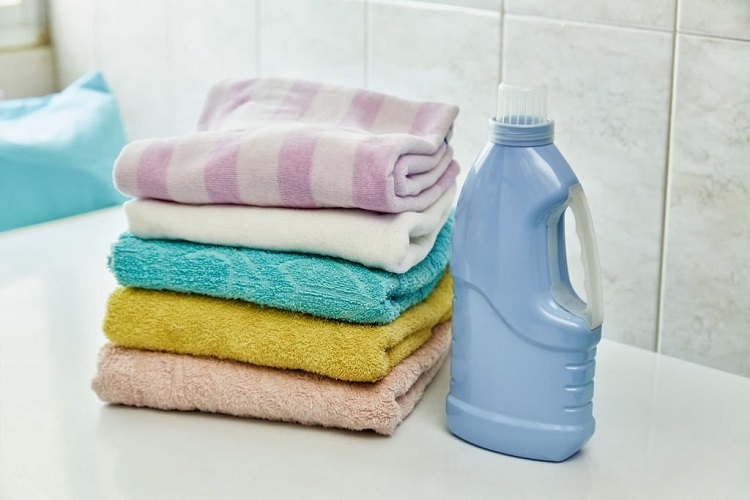A fabric softener can help reduce wrinkles and static cling on clothing and enhance your laundry’s fragrance. But using them on certain materials like towels can negatively affect the fibers.
This article discusses the question of can I use fabric softener on towels, alternative ways to wash towels to make them soft, and materials I shouldn’t use fabric softener on.
Can I Use Fabric Softener on Towels?
A fabric softener or fabric conditioner is applied during the rinse cycle of a washing machine to reduce the harshness of clothes that are dried in the air.
Can I use them on towels? One may ask, well, liquid Fabric Softeners like fabric softeners and dryer sheets contain oils that can coat towel fibers and destroy their absorbency and other fluffy fabrics.
So, please do not use them when drying your towels. Skip the softener every few washes if your towels don’t dry as well as when they are new.
To some people, washing towels may seem easy, but you must follow the right method to prolong their life span. The tips below will help keep your towels looking and feeling fresh even after several washes.
Read: 12 best fabric softeners for babies with sensitive skin
Alternative Ways to Wash Towels to Make Them Soft Again

There are several ways to make your towels soft again without using a fabric softener. Here are some helpful tips you can apply when next you’re washing your towel at home:
1. Wash Towels with Vinegar
Wash colored towels with similar shades in warm water to prevent colors from bleeding for the first several washes.
During washing, use 1/2 the recommended amount of detergent and add 1/2 to 1 cup of white vinegar to the water during the rinse cycle. Applying vinegar will help set the colors and removes excess detergent residue.
2. Replace Fabric Softener with Baking Soda
Baking soda is an excellent alternative to liquid fabric softener as it helps make towels softer.
Adding baking soda to your washing machine will leave your towels smelling fresh after washing.
The baking soda loosens the towel’s fibers and removes product build-up. It also whitens clothes lightly and removes the musty odor from damp towels left in the laundry hamper after the shower.
To use baking soda on towels, add half a cup of the powder in the wash with your laundry detergent, then add your towels and wash on a normal cycle.
3. Wash Towels Separately
A cotton towel often produces lint; since cotton is a natural fiber, thus natural fibers shed.
New towels should be laundered and dried separately during the first few washes to avoid lint picking.
When washing, avoid mixing them with microfiber or corduroy. Washing towels in a separate laundry ensures they get the required attention. This may seem tedious, but it’s all worth it.
4. Reduce the Amount of Laundry Detergent During the Wash
You don’t need too many laundry products when washing towels. Towels that are stiff and scratchy are likely to have a lot of residues. It’s best to use a little less detergent when washing towels, as this reduces the chance of having soapy residue on your towel.
Alternatively, add more water during the wash to avoid product residue.
5. Don’t Overload your Washer and Dryer
Stuffing all your laundry loads in one cycle is never a good idea. Your washer efficiency is limited when there’s insufficient space for clothes to tumble.
The water and the laundry detergent won’t be able to wash your towel as they should. During washing, load your washer and dryer with three towels at a time, with some washcloths or hand towels.
6. Use Warm Water
Washing towels at a temperature close to your body temperature is best. Unlike hot water, using warm when washing won’t damage the cotton fibers.
Also, it can absorb detergent better, leading to less product build-up after washing.
7. Use a Lower Setting in the Dryer
Even the best cotton towels can be affected when subjected to high heat from the dryer. Use a lower heat setting in the dryer when dealing with towels.
Shake the towel before moving it from the washer to the dryer. This helps make the towels fluffy after drying.
Read: Can you put fabric softener in the bleach dispenser? Explained
Other Materials You Shouldn’t Use Fabric Softener On
Microfiber
A great feature of microfiber is that its intricate threads can absorb spills and trap dust. However, using a fabric softener during laundry can destroy its effectiveness.
Sportswear
Athletic wear with wicking technology absorbs sweat from your skin and keeps you cool during exercise. Using fabric softener on these garments will leave a coating that prevents them from wicking.
Flame-resistant clothing
Kids’ sleepwear must be flame-resistant to reduce the risk of catching fire. If you wash children’s pajamas and nightgowns with fabric softener, you risk compromising their flame-resistant properties.
Water-repellent fabric
In the same way that fabric softener could alter flame-resistant clothes, Forte says that fabric softener could also affect the finish’s ability to repel water.” And if that happens, what’s the point of the fabric?
How Often to Wash Towels
There is no need to guess when to wash your towels since you should wash them every three to four days. Warm water and color-safe bleach are the best ways to wash colored towels, if necessary.
Use hot water and non-chlorine bleach as needed for white towels. To avoid subtle discoloration over time, you should separate white towels from other white items.
Related Articles:
- How To Use Fabric Stiffeners
- Can I fabric softener in my carpet cleaner?
- Is it ok to use fabric softener on baby clothes? Explained
Wind-Up
Hopefully, this article has answered the question on your lips, “can I use fabric softener on towels?” Fabric softeners should not be used when washing towels since it leaves residues that reduce your towel’s fluffiness and absorbency. Following these tips mentioned above will keep your towels soft without altering their quality and integrity.
